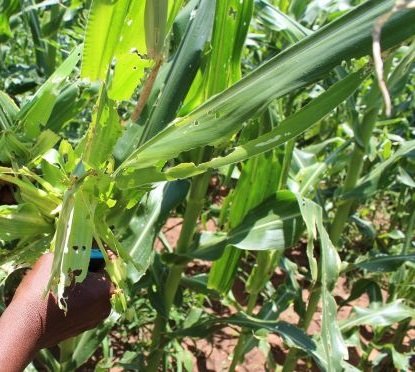…as they resort to indigenous knowledge system
Courage Dutiro
Communal farmers in Masvingo district have resorted to using women’s urine and river sand in controlling the devastating Fall Armyworm that perennially affects their crops during the rainy season.
Due to a shortage of free agricultural inputs like pesticides, Moses Mutoko a farmer in Wendedzo area of Masvingo North said they have resorted to using river sand in fighting against the destructive fall armyworm.
“This year we received few inputs, those who afford to buy chemicals are using chemicals to control worms but those who cannot afford are using river sand to save their crops from the Fall Armyworm.
“The Armyworm damage corn plants mainly during the vegetative and tussling stage,” said Mutoko.
He also said the late planted crops are under attack and farmers are struggling to control the ‘second generation’ of the worm.
“Those who planted late (in January) are struggling to control the armyworm. Their crops are so far under attack.
“I think the worm hatched during the first planting phase and now the second generation of worms is attacking the late planted crops,” he said.
The farmer also lamented water logging as another problem that is going to affect the quality and yield of crops.
He also added that some of the crops that were planted using the Pfumvudza way were affected by the dry spell that prevailed in January.
During the 2022 Masvingo agricultural show, Onias Murove a farmer in Summerton area (ward 6 Mayo) in Masvingo district said women’s urine was one of the solutions that they were using to control army worms.
“We have resorted to non-chemical ways of controlling the worms; we are using women’s urine and sand to reduce the army worm’s intensity. Pouring urine and sand at the maize plant help to reduce the attack,” said Murove.
During the provincial show, Murove won a wheelbarrow and 5 kilograms of maize seed under the Pfumvudza category.







